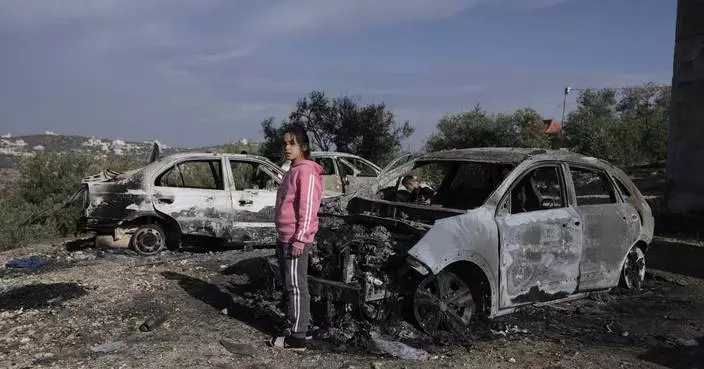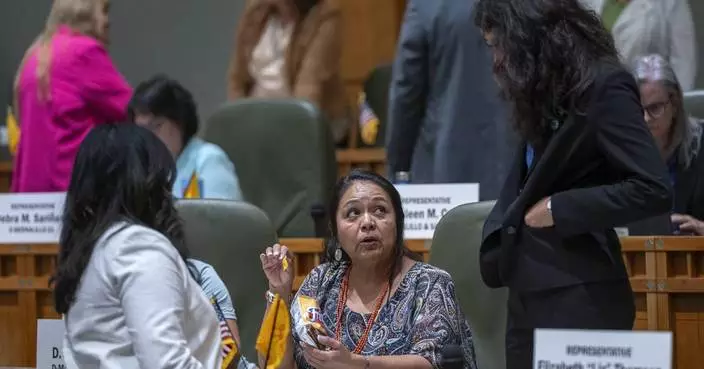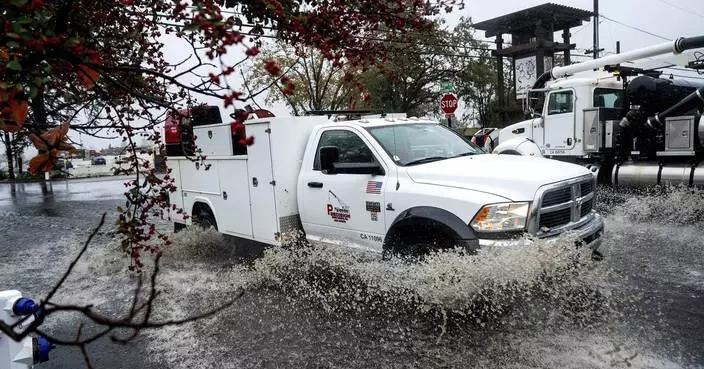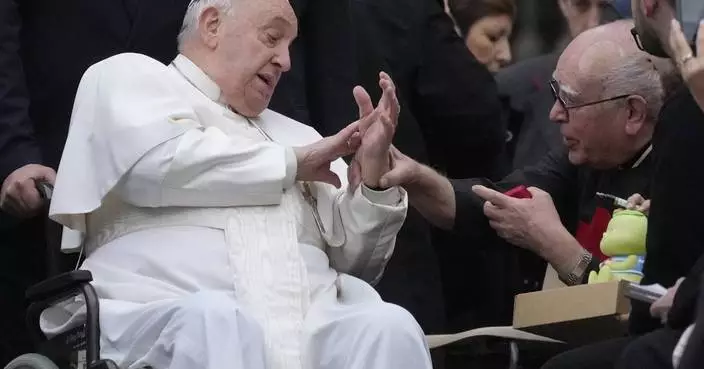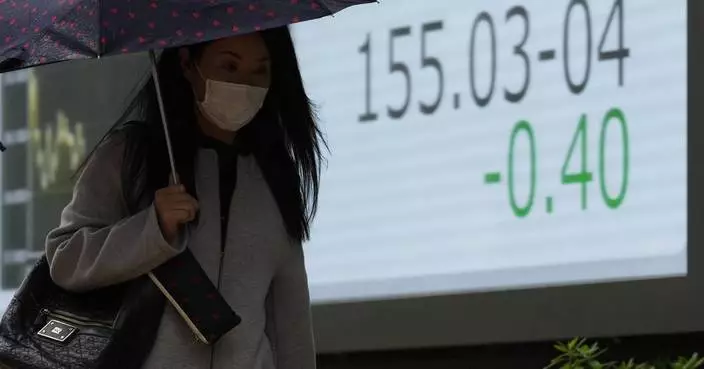RALEIGH, N.C. (AP) — North Carolina Republican legislators gave final approval Wednesday to a series of political power moves that would weaken the incoming governor and other Democratic elected officials in the ninth-largest state. They're contained in a massive bill sprinkled with a new round of Hurricane Helene relief provisions and rushed through a lame-duck General Assembly session.
The Senate voted along party lines for the 131-page measure, which would alter yet again how the State Board of Elections is appointed, likely leading to a GOP majority on a panel now controlled by Democrats. It also would move up in 2025 several post-election deadlines after Republican complaints that counties took too long this month to count provisional and absentee ballots, especially in light of an extremely close Supreme Court race.
The House approved the same measure Tuesday night, so the bill goes next to the desk of outgoing Democratic Gov. Roy Cooper, who has blasted the effort as “massive power grabs.” Other Democrats called provisions unconstitutional. Any veto override attempt would happen early next month.
The measure was approved less than 24 hours after it was made broadly public in the final weeks before Republicans' veto-proof majority ends following electoral defeats in the House this month.
Cooper leaves office at year’s end and will be succeeded by fellow Democrat Josh Stein, whose veto likely will be able to block Republican measures if Democratic legislators remain united. So this may be the last time for a while for Republicans to force through such partisan changes.
State lawmakers meeting twice this fall already approved with near unanimous support legislation setting aside over $900 million toward Helene relief and recovery. Cooper has asked for much more — at least $3.9 billion — and quickly. While this week’s bill locates an additional $252 million for Helene relief, nearly all of it can’t be spent until the General Assembly acts again.
“Power would have been lifting up the people of western North Carolina so they can rebuild,” Sen. Lisa Grafstein of Wake County said Wednesday. “This bill is a weak and sorry display. It shows an inability to manage not just this moment — it shows an inability to manage the emotional discipline to accept basic democratic balance.”
The bill marks yet another effort by Republicans to wrest State Board of Elections appointments from the governor, whose party always holds three of the five seats. Other measures have been blocked by courts, including a 2023 law that would move board appointment authority from the governor to the General Assembly.
Under the bill that authority would go to the State Auditor's Office — that will be led by Republican Dave Boliek, who was elected this month — starting in May, with the board's placement under his office weeks later. The changes likely would mean Republican board control in the near future and filter down to county election boards, too.
Republicans said the changes will lead to more efficiency and the quicker release of vote counts.
“The purpose of these changes is to ensure a timelier resolution of election outcomes than we have continuing to drag on for two weeks like we’ve seen in the most recent election,” said Republican Sen. Ralph Hise, of Mitchell County.
No other state has such a structure where the state auditor has election responsibilities, said David Becker, a former U.S. Justice Department lawyer who runs the Center for Election Innovation & Research. He called the proposal “deeply troubling.”
“This is a radical change to the structure of election boards and changes to procedures that will affect voters,” Becker said in an interview. “It will almost certainly result in valid ballots being thrown out and create huge burdens on election officials.”
The legislation also would immediately weaken the governor’s authority to fill vacancies on the state Court of Appeals and Supreme Court by limiting his choice to candidates offered by the political party of the outgoing justice or judge.
Stein, who is currently attorney general, will be succeeded by fellow Democratic U.S. Rep. Jeff Jackson. The bill would limit the attorney general by barring him from taking legal positions contrary to the General Assembly in litigation challenging a law’s validity. Stein recently declined to defend parts of laws that restrict surgical abortions and abortion pills.
“We saw no change likely to occur” with Jackson's arrival, Senate leader Phil Berger told reporters, “and felt it was time for us to take steps.”
The bill also would prevent the superintendent of public instruction — a post to be held by Democrat Mo Green — from appealing decisions by a state board that reviews charter school applications.
Bill opponents watched the Senate debate. After there was applause for a Democratic senator’s speech, outgoing GOP Lt. Gov. and presiding officer Mark Robinson cleared the gallery, calling those present “immature people.” No arrests were made.
The bill is a reminder of legislation that Republicans approved in late 2016, weeks before Cooper was to succeed Republican Gov. Pat McCrory, that also weakened the governor’s powers. That led to demonstrations, arrests and years of lawsuits.
__
Associated Press writer Christina A. Cassidy in Atlanta contributed.
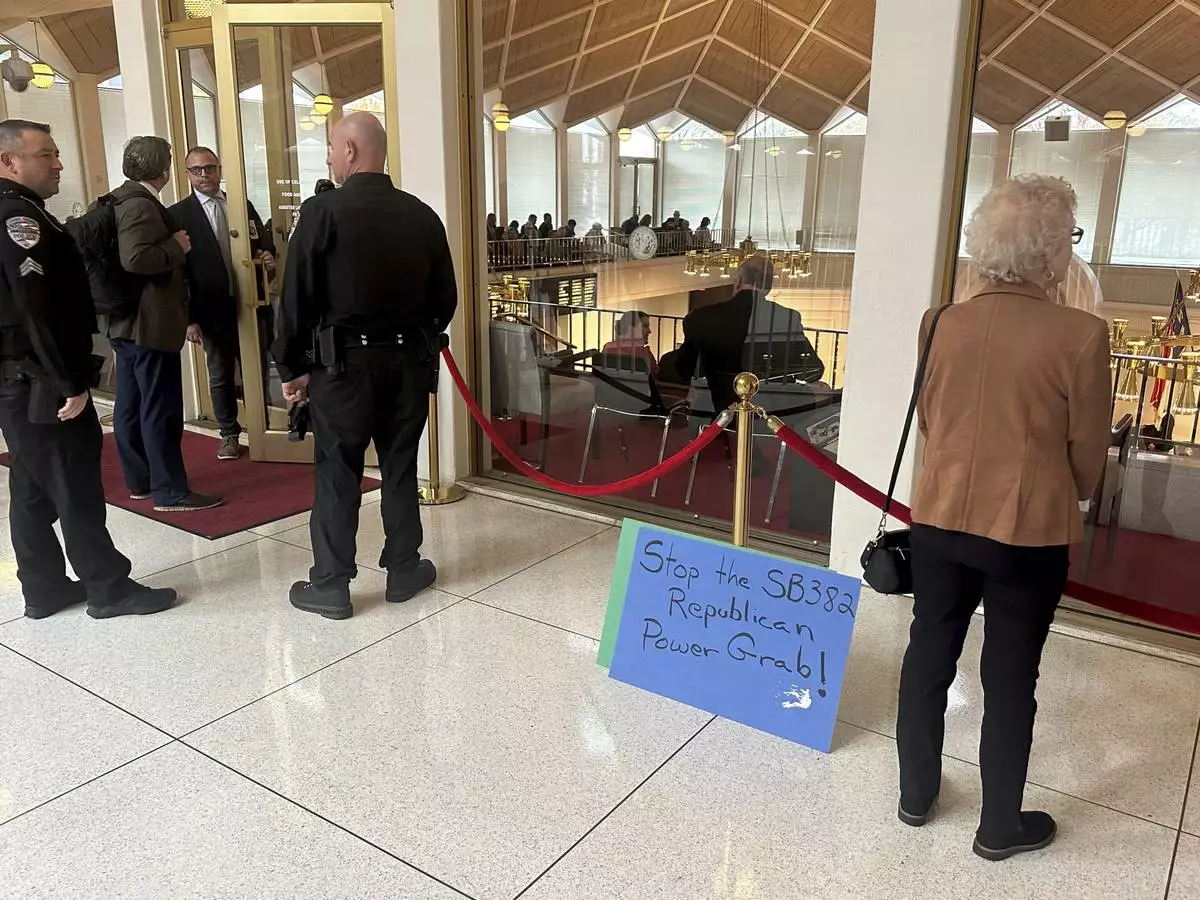
A placard expressing opposition to a Republican-penned measure being debated sits outside the North Carolina Senate gallery at a Legislative Building news conference in Raleigh, N.C., Wednesday, Nov. 20. 2024. (AP Photo/Gary D. Robertson)
BAKU, Azerbaijan (AP) — Countries of the world took turns rejecting a new but vague draft text released early Thursday which attempts to form the spine of any deal reached at United Nations climate talks on money for developing countries to transition to clean energy and adapt to climate change.
The draft left out a crucial sticking point: how much wealthy nations will pay poor countries. A key option for the lowest amount donors are willing to pay was just a placeholder “X.” Part of that is because rich nations have yet to make an offer in negotiations.
So the host Azerbaijan presidency with its dawn-released package of proposals did manage to unite a fractured world on climate change, but it was only in their unease and outright distaste for the plan. Negotiators at the talks — known as COP29 — in Baku, are trying to close the gap between the $1.3 trillion the developing world says is needed in climate finance and the few hundred billion that negotiators say richer nations have been prepared to give.
Independent experts say that at least $1 trillion is needed in finance to help transition away from planet-warming fossil fuels and toward clean energy like solar and wind, better adapt to the effects of climate change and pay for losses and damages caused by extreme weather.
Colombia's environment minister Susana Mohamed said without a figure offered by developed nations, “we are negotiating on nothing.”
Panama's Juan Carlos Monterrey Gomez said the “lack of commitment transparency feels like a slap in the face to the most vulnerable."
"It is just utter disrespect to those countries that are bearing the brunt of this crisis,” he said. “Developed countries must stop playing games with our life and put a serious quantified financial proposal on the table.”
Gomez listed places where negotiators worked on the issue: South Africa, Germany, the Philippines, Egypt, Austria, Switzerland, Dubai, Colombia and a few times here in Baku, asking “For God’s sakes, what’s the next stop? Mars? Do we need to go to outer space to get a quantitative number from our developed countries to be able to start negotiating here?”
Esa Ainuu, from the small Pacific island of Niue also blasted the lack of a number in the draft deal.
“For us in the Pacific, this is critical for us,” Ainuu said. “We can’t escape to the desert. We can’t escape somewhere else. This is reality for us. If finance is not bringing any positive, (then) why’re we coming to COP?”
Mohamed Adow, director of the think tank Power Shift Africa, also expressed disappointment at the lack of a figure. “We need a cheque but all we have right now is a blank piece of paper,” he said.
Iskander Erzini Vernoit, director of Moroccan climate think-tank Imal Initiative for Climate and Development, said he was “at a loss for words at how disappointed we are at this stage to have come this far without serious numbers on the table and serious engagement from the developed countries.”
Even United Nations Secretary-General Antonio Guterres said, “I don’t think you can go on and on and on without clarifying the key aspects of the negotiation.”
Lead negotiator Yalchin Rafiyev emphasized how balanced the plan was, but all sides kept saying it was anything but balanced and pointed time was running out.
“We would like to correct the balance. It is completely tilted,” Pakistan delegate Romina Khurshid Alam said.
The European Union’s climate envoy Wopke Hoekstra called the draft “imbalanced, unworkable, and not acceptable.”
And Xia Yingxian, a member of China delegation, also said the current draft text contains many “unsatisfied and unacceptable” parts.
In a statement, the COP29 Presidency stressed that the drafts “are not final.”
“The COP29 Presidency’s door is always open, and we welcome any bridging proposals that the parties wish to present,” the Presidency said in a statement. It added that possible numbers for a finance goal will be released in the next iteration of the draft.
COP29 President Mukhtar Babayev convened the Qurultay — a traditional Azerbaijani meeting — where negotiators spoke to hear all sides and hammer out a compromise. He said that “after hearing all views, we will outline a way forward regarding future iterations.”
Other areas that are being negotiated include commitments to slash planet-warming fossil fuels and how to adapt to climate change. But they’ve seen little movement.
European nations and the United States criticized the package of proposals for not being strong enough in reiterating last year’s call for a transition away from fossil fuels.
“The current text offers no progress” on efforts to cut the world’s emissions of heat-trapping gases, said Germany delegation chief Jennifer Morgan. “This cannot and must not be our response to the suffering of millions of people around the world. We must do better.”
U.S. climate envoy John Podesta said he was surprised that “there is nothing that carries forward the ... outcomes that we agreed on last year in Dubai.” The United States, the world’s biggest historic emitter of greenhouse gases, has played little role in the talks as it braces for another presidency under Donald Trump.
But members of the Beyond Oil and Gas Alliance such as Colombia, Ireland and Denmark, who are pushing for an end of fossil fuels, said the lack of wording on transitioning away from fossil fuels is not a deal killer for them.
Days earlier, the 20 largest economies met in Brazil and didn't mention the call for transitioning away from fossil fuels. Guterres, who was at that meeting, said official language is one thing, but reality is another.
“There will be no way” the world can limit global warming to 1.5 degrees Celsius "if there is not a phase out of fossil fuels,” Guterres said at a Thursday news conference.
Also on Thursday, the EU, Mexico, Norway and several other countries announced they would release plans to rapidly cut emissions over the next decade to meet the landmark Paris agreement’s goal of restraining global warming to 1.5 degrees Celsius (2.7 Fahrenheit) above pre-industrial times, although they did not detail how those cuts would happen.
Under the agreement, countries need to detail their voluntary plans for reducing greenhouse gas emissions by early next year.
“There is a real risk of falling short,” said Tore Sandvik, Norway’s minister of climate and environment. “We must reinforce the message that the Paris agreement is functioning as intended.”
Associated Press journalists Ahmed Hatem and Olivia Zhang contributed to this report.
The Associated Press’ climate and environmental coverage receives financial support from multiple private foundations. AP is solely responsible for all content. Find AP’s standards for working with philanthropies, a list of supporters and funded coverage areas at AP.org.
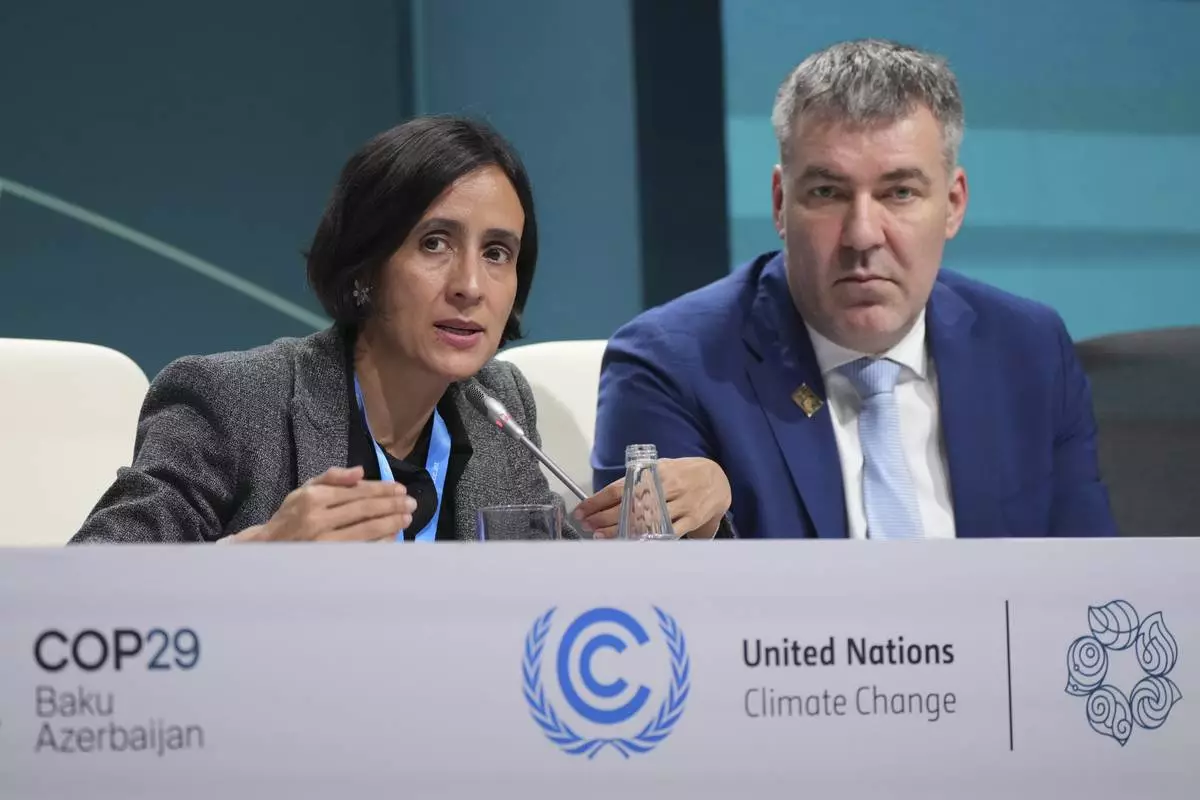
Susana Muhamad, environment minister of Colombia, left, speaks at a session next to Denmark Climate Minister Lars Aagaard during a session at the COP29 U.N. Climate Summit, Thursday, Nov. 21, 2024, in Baku, Azerbaijan. (AP Photo/Sergei Grits)
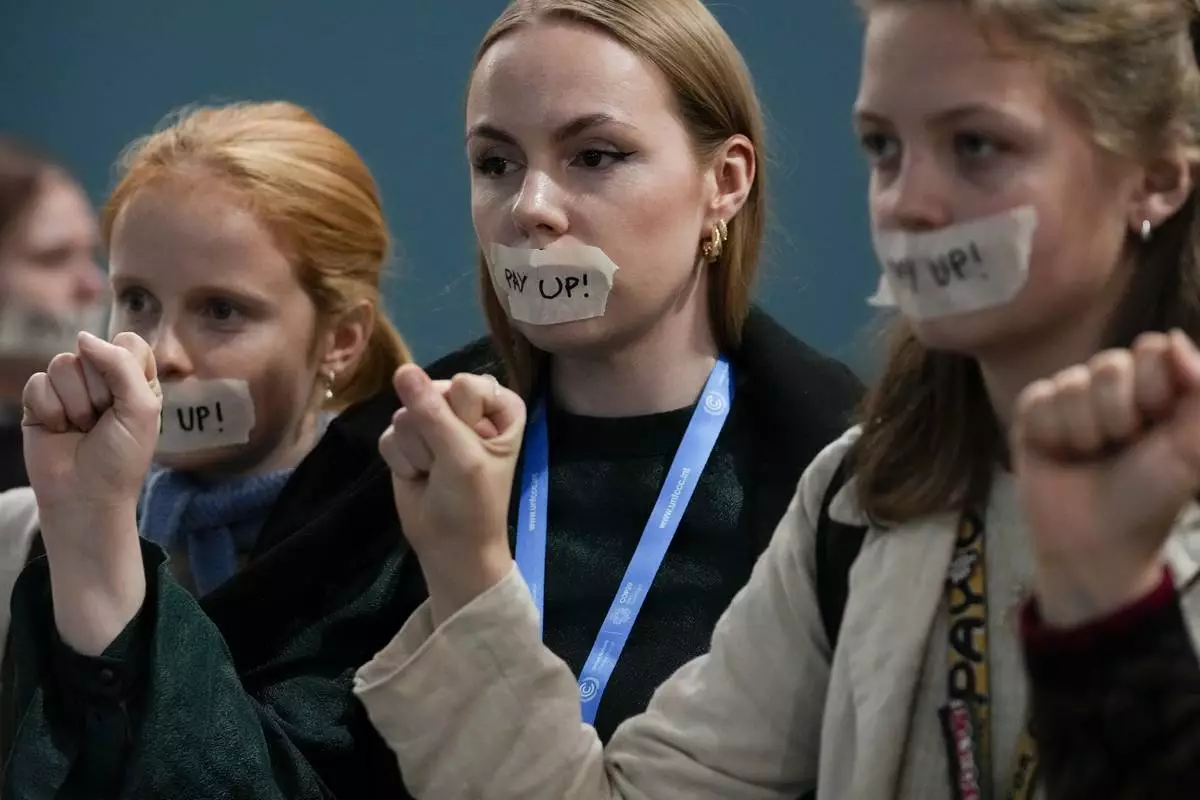
Attendees have "pay up" taped on their mouth during the People's Plenary at the COP29 U.N. Climate Summit, Thursday, Nov. 21, 2024, in Baku, Azerbaijan. (AP Photo/Rafiq Maqbool)
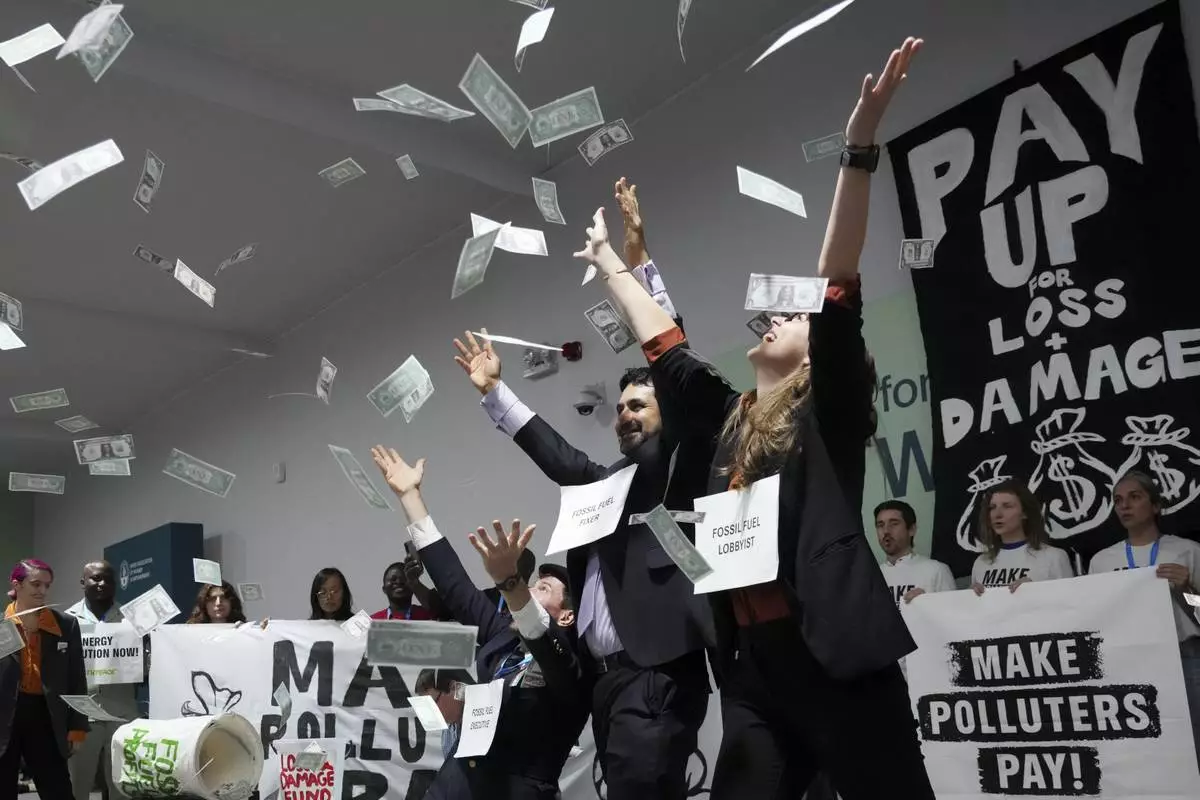
Activists participate in a demonstration for climate finance at the COP29 U.N. Climate Summit, Thursday, Nov. 21, 2024, in Baku, Azerbaijan. (AP Photo/Sergei Grits)
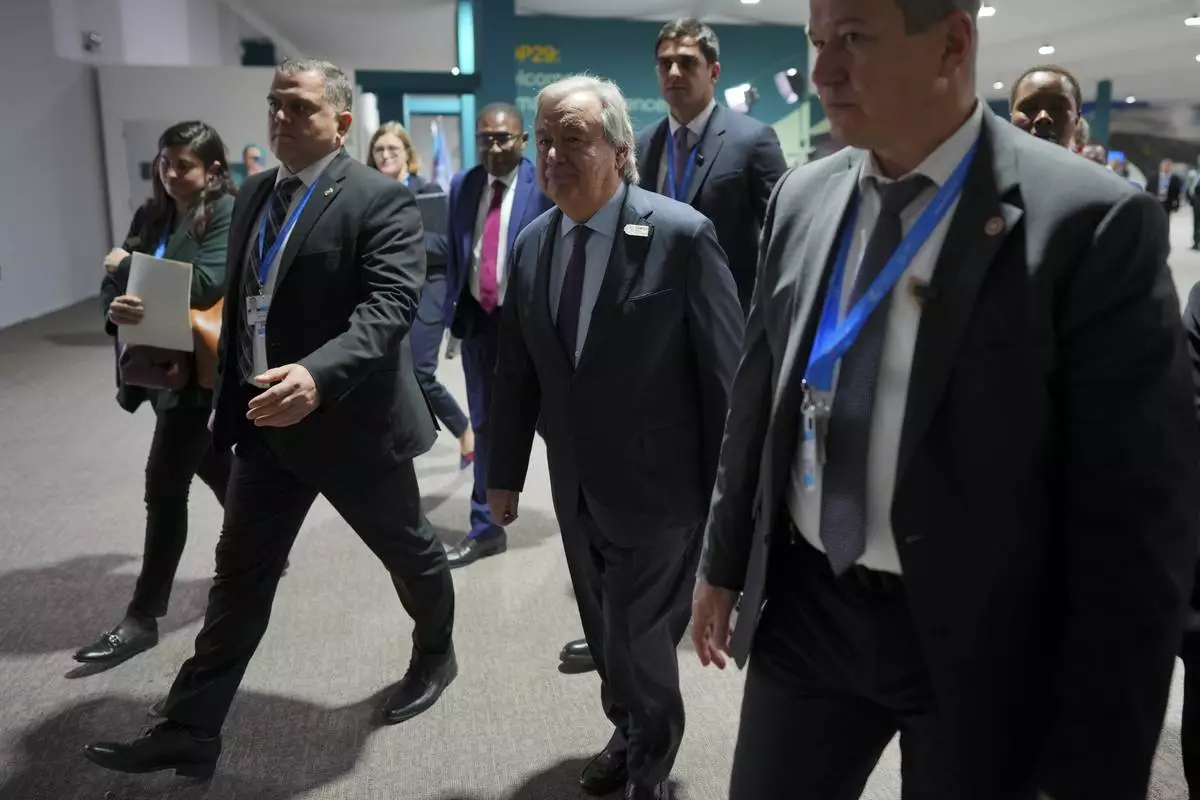
Antonio Guterres, United Nations secretary-general, arrives for a news conference at the COP29 U.N. Climate Summit, Thursday, Nov. 21, 2024, in Baku, Azerbaijan. (AP Photo/Peter Dejong)
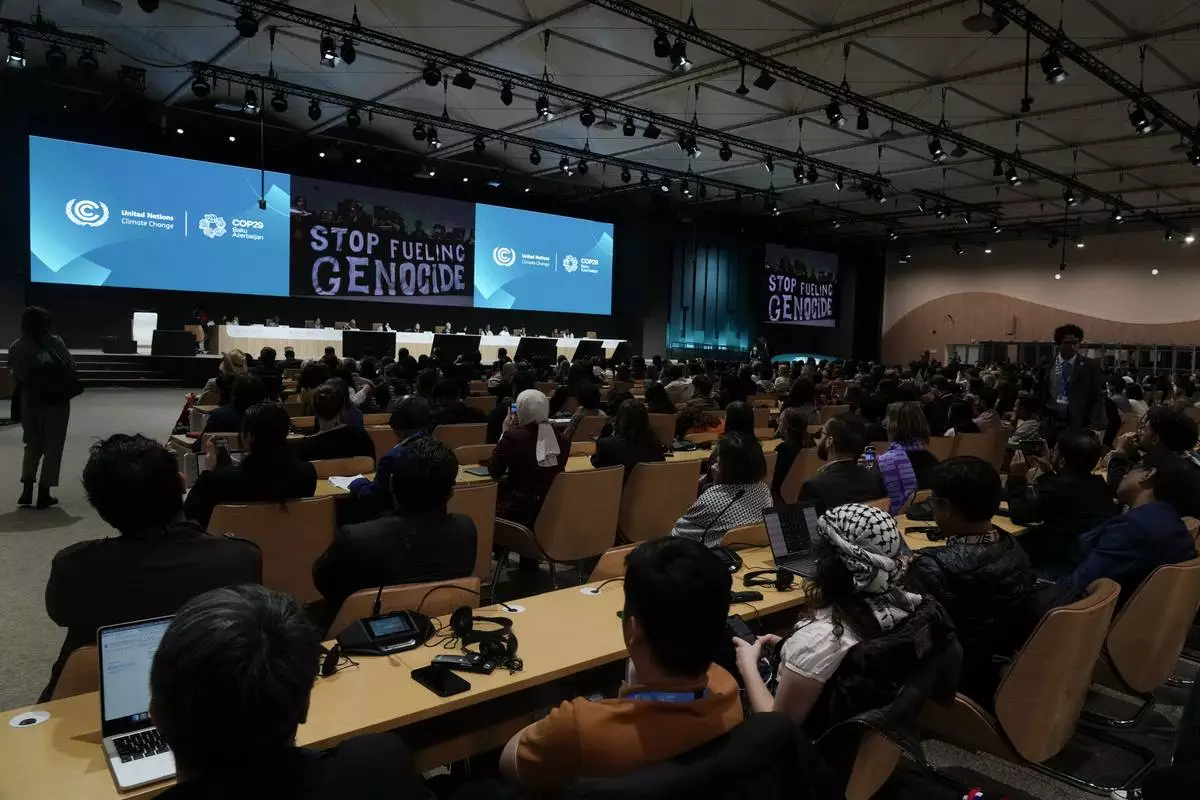
Activists display signs that read "stop fueling genocide" during the People's Plenary at the COP29 U.N. Climate Summit, Thursday, Nov. 21, 2024, in Baku, Azerbaijan. (AP Photo/Rafiq Maqbool)
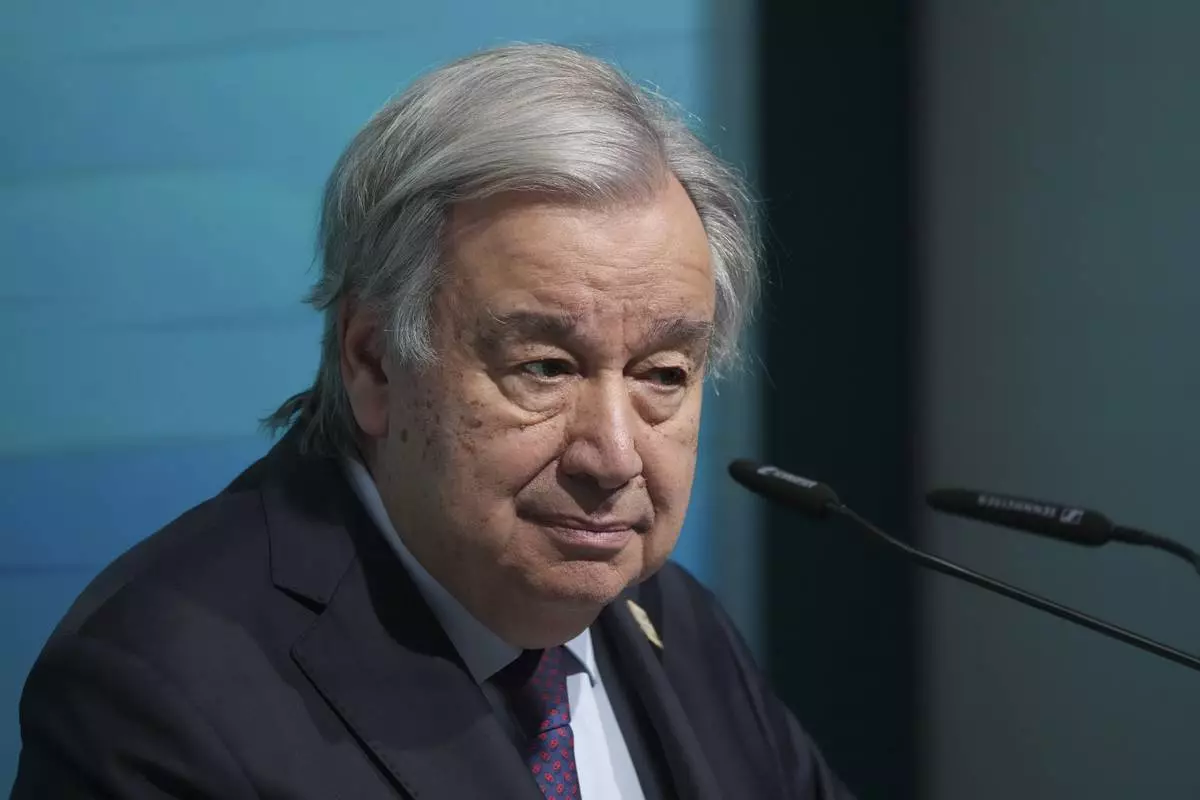
Antonio Guterres, United Nations secretary-general, speaks during a news conference at the COP29 U.N. Climate Summit, Thursday, Nov. 21, 2024, in Baku, Azerbaijan. (AP Photo/Sergei Grits)
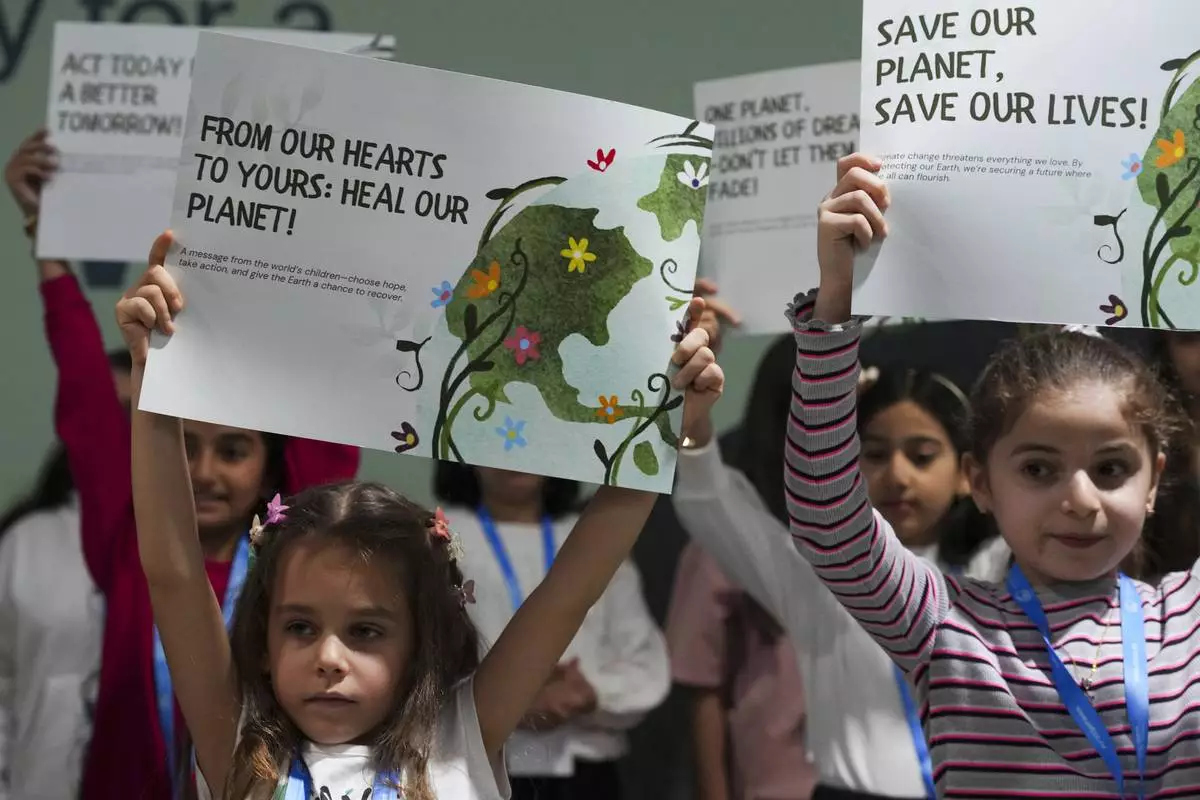
Children advocate for a clean planet during the COP29 U.N. Climate Summit, Thursday, Nov. 21, 2024, in Baku, Azerbaijan. (AP Photo/Peter Dejong)
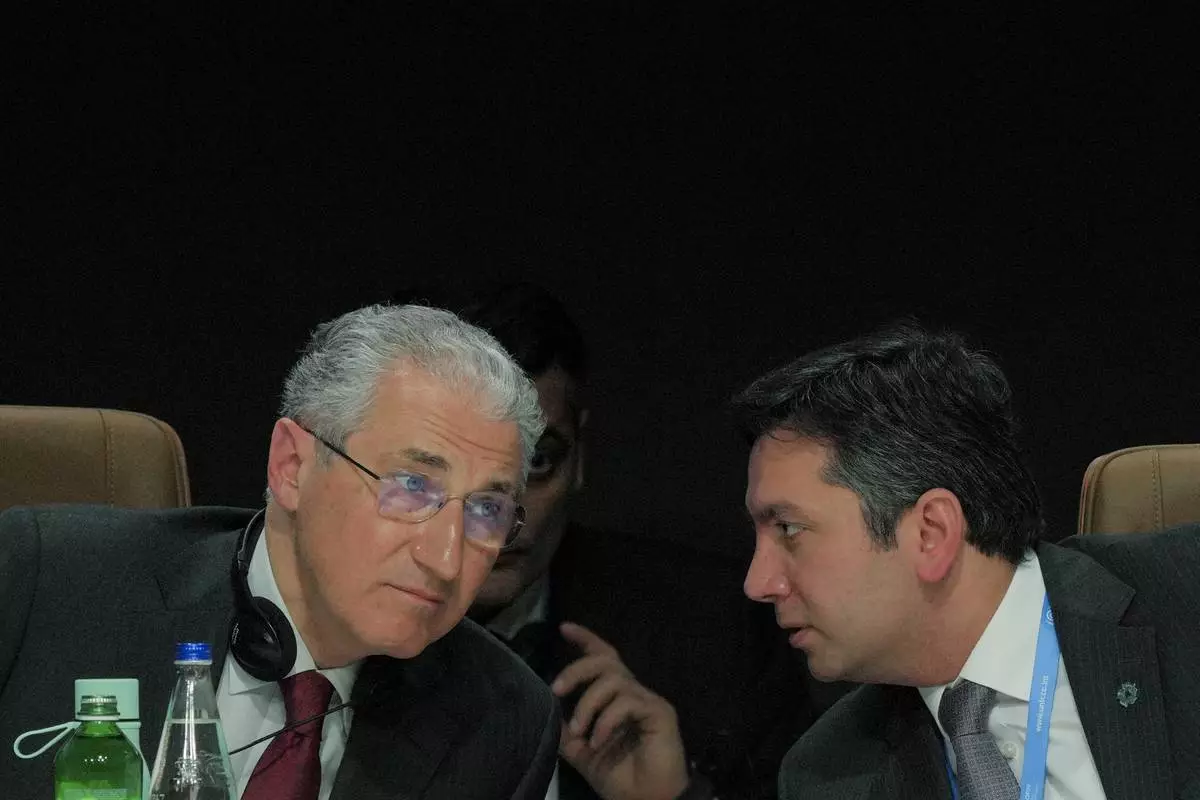
Mukhtar Babayev, COP29 President, left, and Yalchin Rafiyev, Azerbaijan's COP29 lead negotiator, speak during a plenary session at the COP29 U.N. Climate Summit, Thursday, Nov. 21, 2024, in Baku, Azerbaijan. (AP Photo/Peter Dejong)
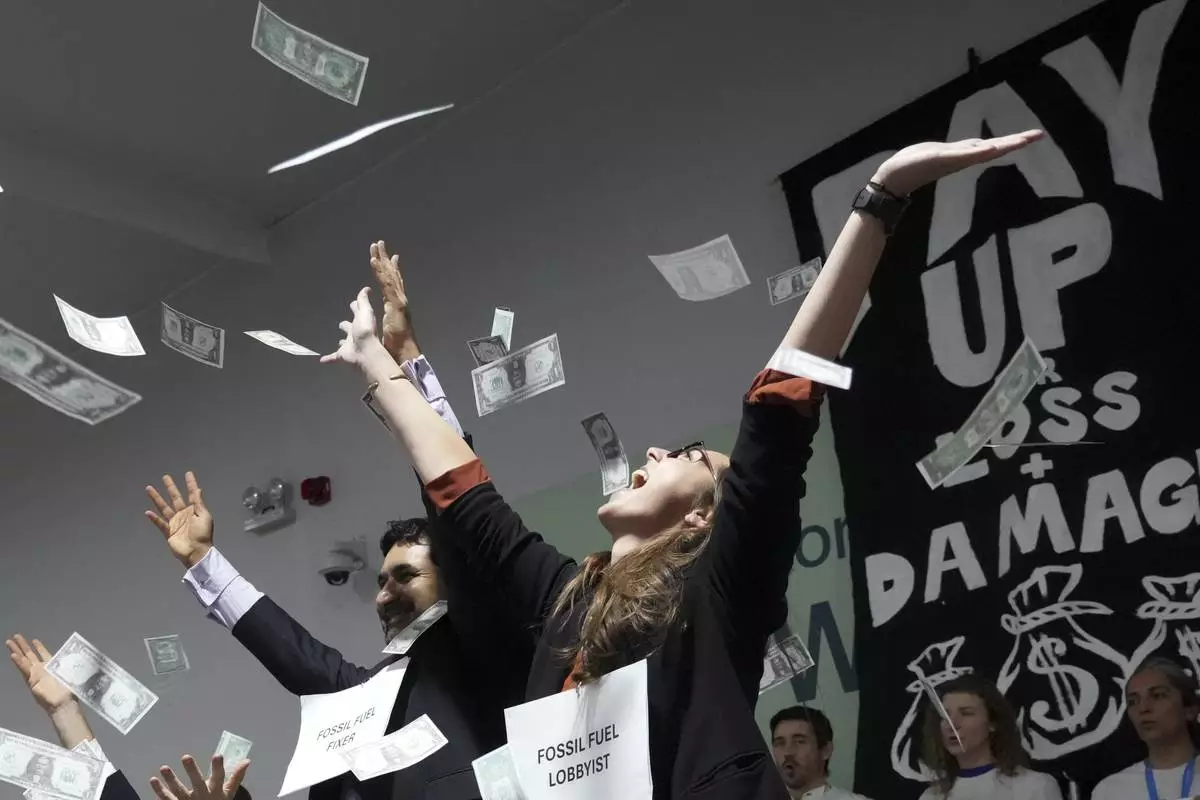
Activists participate in a demonstration for climate finance at the COP29 U.N. Climate Summit, Thursday, Nov. 21, 2024, in Baku, Azerbaijan. (AP Photo/Sergei Grits)
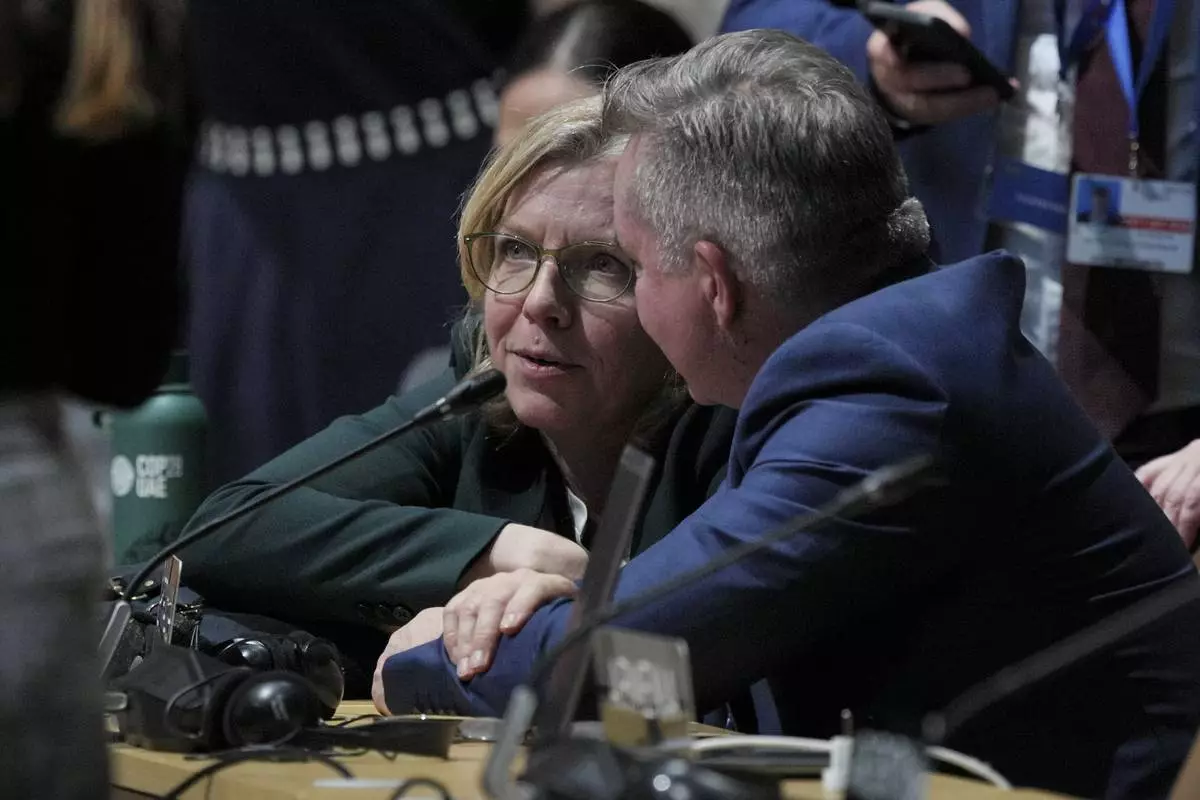
Austria Climate Minister Leonore Gewessler, left, talks with Australia Climate Minister Chris Bowen before a plenary session at the COP29 U.N. Climate Summit, Thursday, Nov. 21, 2024, in Baku, Azerbaijan. (AP Photo/Peter Dejong)
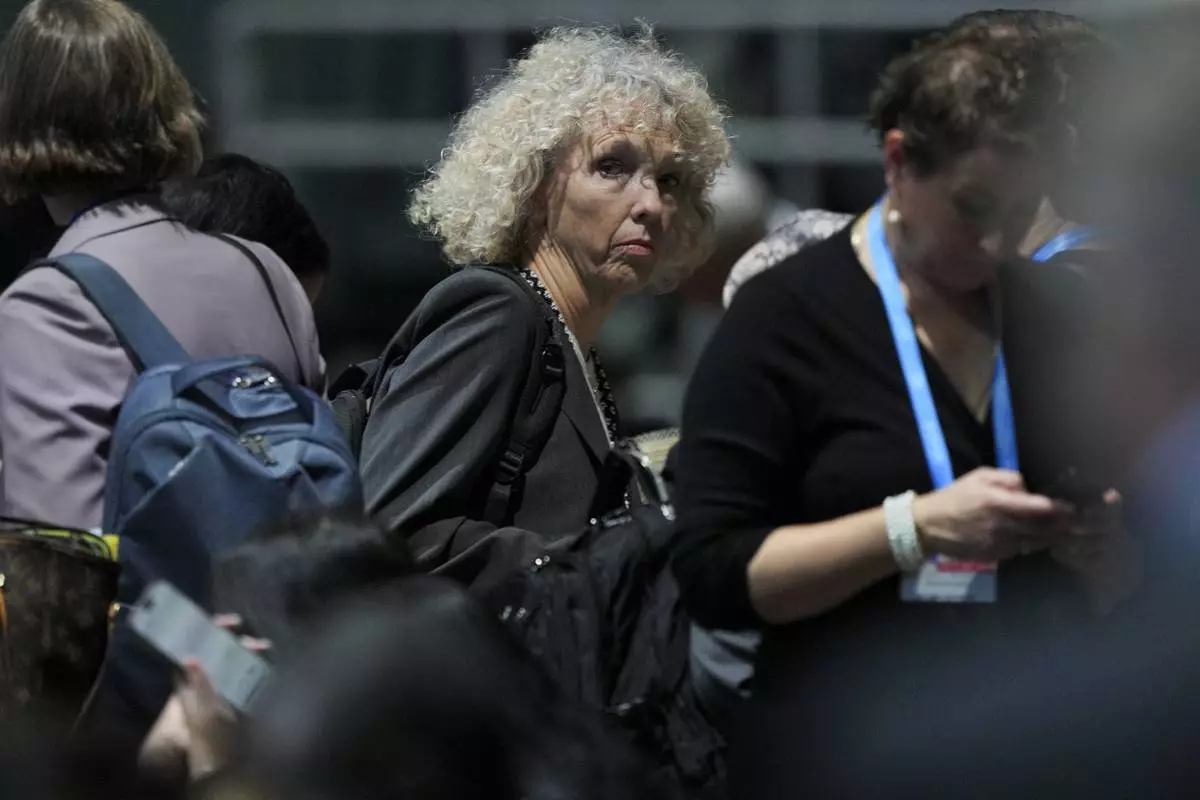
Jennifer Morgan, Germany climate envoy, arrives ahead of a plenary session at the COP29 U.N. Climate Summit, Thursday, Nov. 21, 2024, in Baku, Azerbaijan. (AP Photo/Peter Dejong)
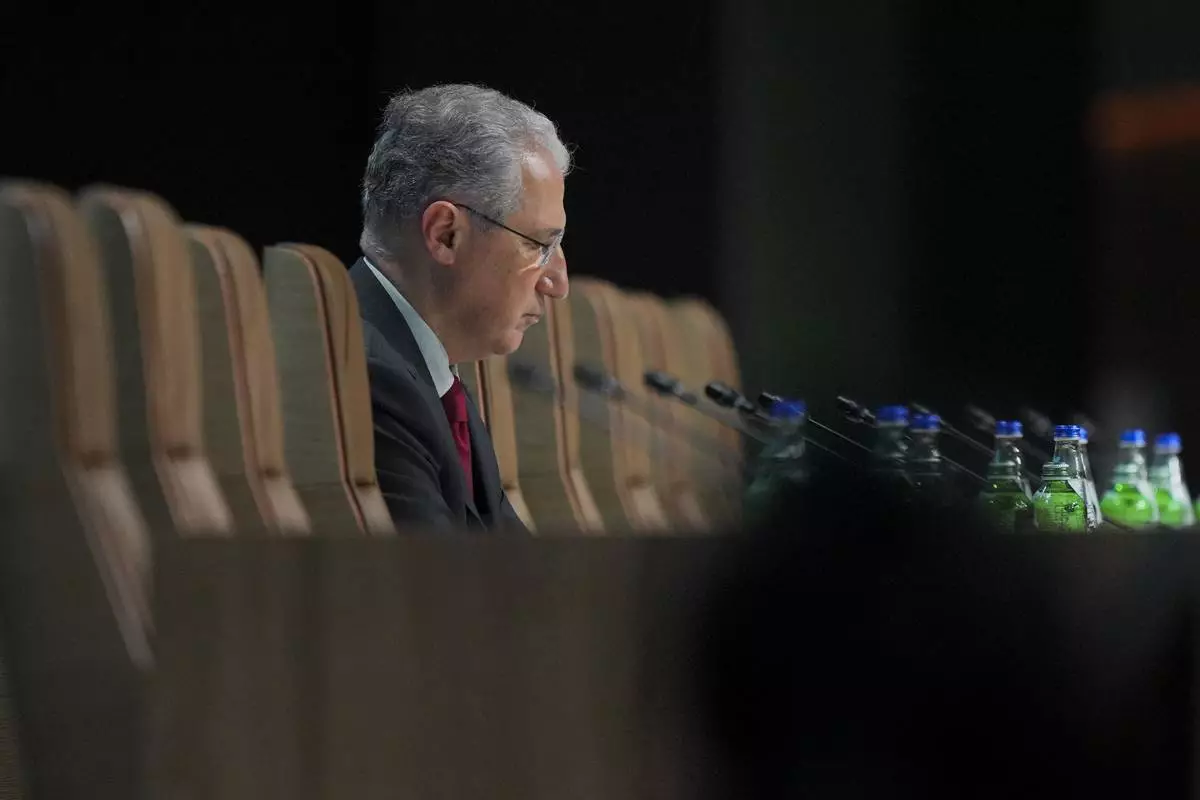
Mukhtar Babayev, COP29 President, arrives for a plenary session at the COP29 U.N. Climate Summit, Thursday, Nov. 21, 2024, in Baku, Azerbaijan. (AP Photo/Peter Dejong)
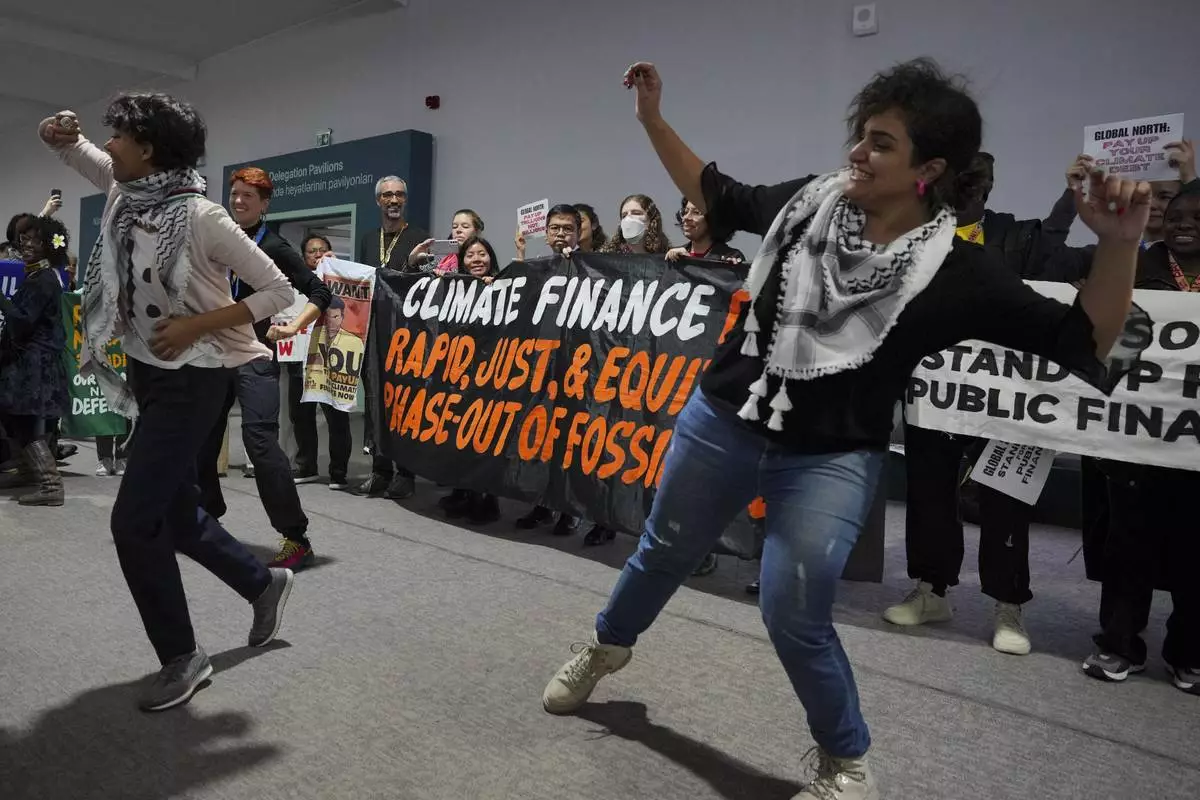
Activists participate in a demonstration for climate finance at the COP29 U.N. Climate Summit, Thursday, Nov. 21, 2024, in Baku, Azerbaijan. (AP Photo/Peter Dejong)
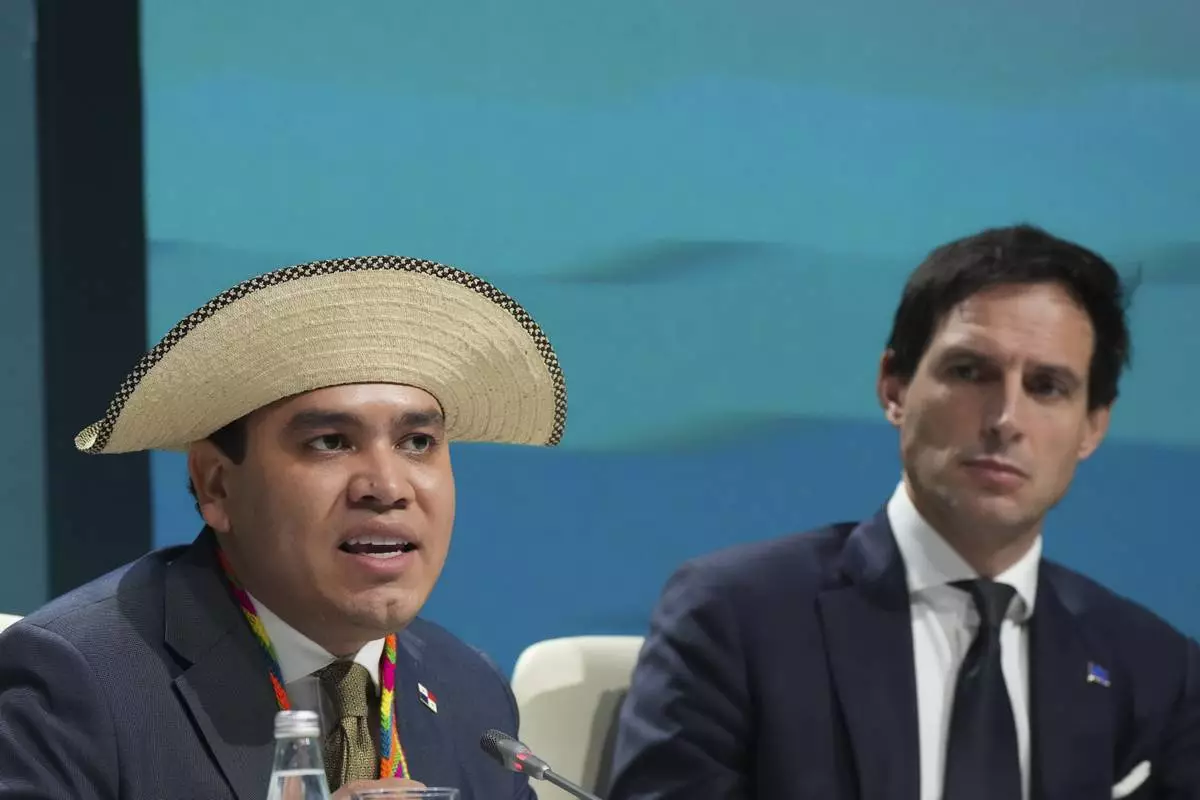
Panama Climate Envoy Juan Carlos Monterrey Gomez, left, and Wopke Hoekstra, EU climate commissioner, attend a session on climate targets during the COP29 U.N. Climate Summit, Thursday, Nov. 21, 2024, in Baku, Azerbaijan. (AP Photo/Sergei Grits)
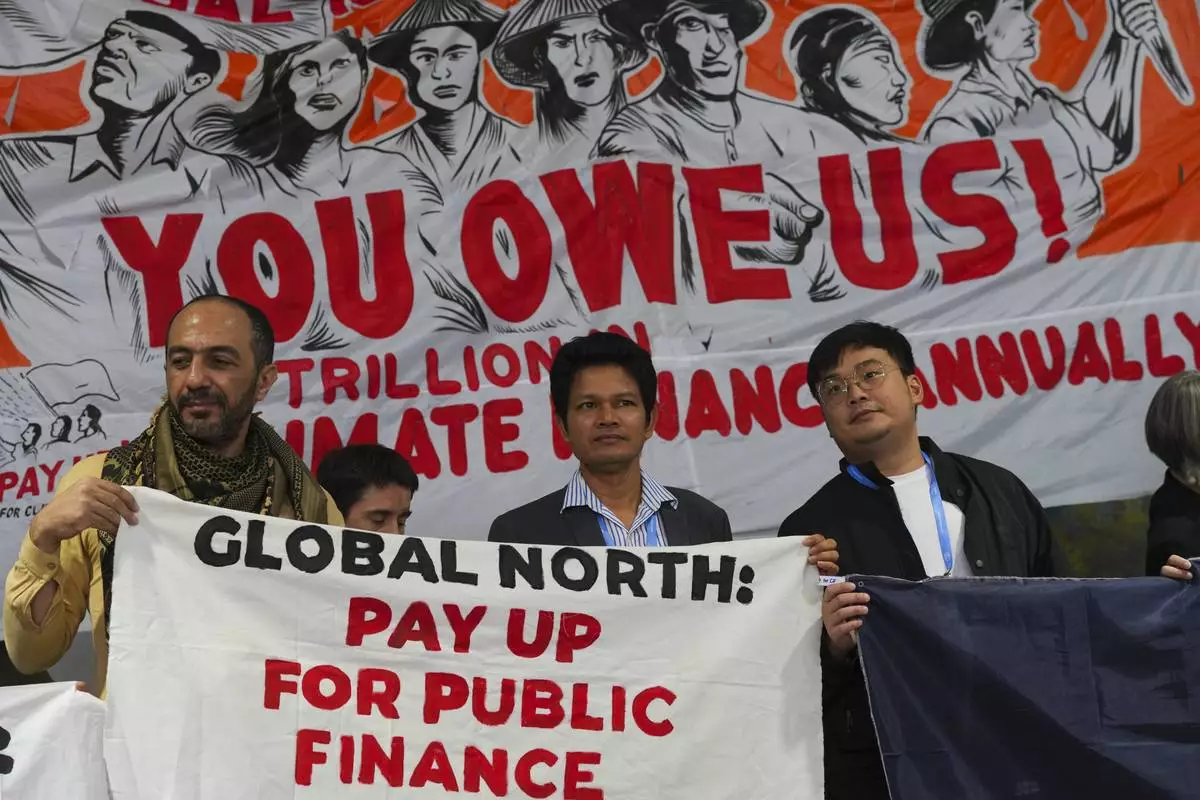
Activists participate in a demonstration for climate finance at the COP29 U.N. Climate Summit, Thursday, Nov. 21, 2024, in Baku, Azerbaijan. (AP Photo/Peter Dejong)
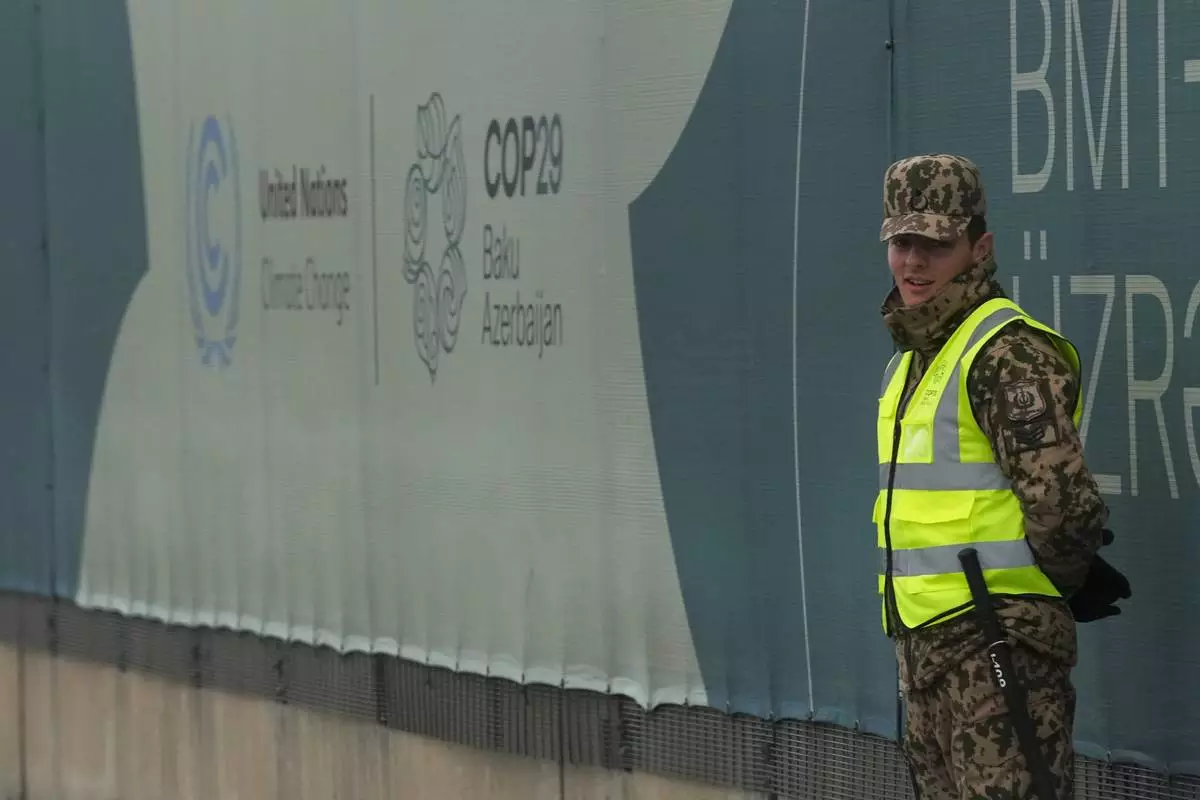
A security person stands near a logo for the COP29 U.N. Climate Summit, Thursday, Nov. 21, 2024, in Baku, Azerbaijan. (AP Photo/Peter Dejong)
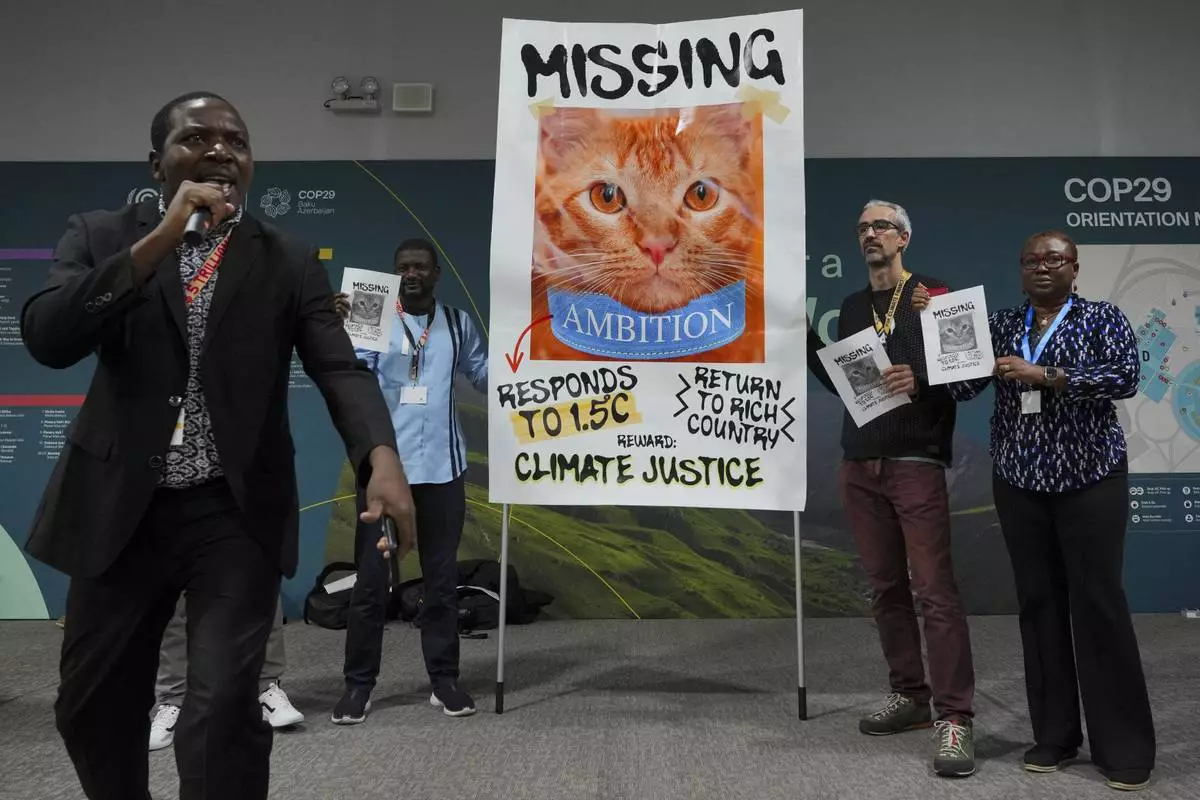
Activists participate in a demonstration for climate justice at the COP29 U.N. Climate Summit, Thursday, Nov. 21, 2024, in Baku, Azerbaijan. (AP Photo/Peter Dejong)





















